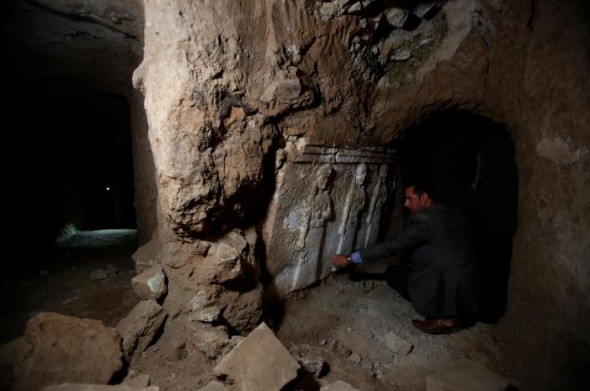
Archaeologist Musab Mohammed Jassim shows artifacts and archaeological pieces in a tunnel network running under the Mosque of Prophet Jonah, Nabi Yunus in Arabic, in eastern Mosul, Iraq March 9, 2017. (Photo: REUTERS/Suhaib Salem)
ishtartv.com - christianpost.com
By Stoyan Zaimov ,
Christian Post Reporter | Feb 19, 2018
Ancient
2,700-year-old inscriptions have been uncovered underneath the biblical Tomb of
Jonah, which was destroyed by Islamic State terror group militants in 2014 in
Iraq. The inscriptions mention "great gods" belonging to the Assyrian
tradition.
The
latest archaeological digs beneath the tomb have discovered inscriptions
describing the rule of the Assyrian king Esarhaddon, who is mentioned in the
Hebrew Bible, LiveScience reported.
"The
palace of Esarhaddon, strong king, king of the world, king of Assyria, governor
of Babylon, king of Sumer and Akkad, king of the kings of lower Egypt, upper
Egypt and Kush [an ancient kingdom located south of Egypt in Nubia]," one
of the deciphered engravings reads.
Esarhaddon
is also said to have "reconstructed the temple of the god Aššur [the chief
god of the Assyrians]," another inscription reads. It adds that Esarhaddon
also rebuilt the ancient cities of Babylon and Esagil, and "renewed the
statues of the great gods."
Iraqi
archaeologists, who gained access to the tunnels dug by IS, have in the past
also found
"winged bulls and lions" belonging to Esarhaddon, who ruled
the Neo-Assyrian empire in 7th century B.C.
IS
originally destroyed the shrine, which is sacred to both Christians and
Muslims, while searching for artifacts to loot. The radicals were pushed out of
the city of Nineveh in the beginning of 2017, and have lost the majority of
their captured territory in Iraq and Syria.
Esarhaddon
is also said to have renovated a palace built for King Sennacherib, whose
military rule is described in II Chronicles 32:1 in the Old Testament, reading:
"After all that Hezekiah had so faithfully done, Sennacherib king of
Assyria came and invaded Judah. He laid siege to the fortified cities, thinking
to conquer them for himself."
Archaeologist
Layla Salih has said about the findings: "I can only imagine how much
Daesh (IS) discovered down there before we got here."
"We
believe they took many of the artifacts, such as pottery and smaller pieces,
away to sell. But what they left will be studied and will add a lot to our
knowledge of the period."
Archaeologists
have found stone sculptures of other ancient deities, such as an Assyrian
demi-goddess believed to sprinkle "water of life" to protect humans
in her care.
"There's
a huge amount of history down there, not just ornamental stones," Salih
added. "It is an opportunity to finally map the treasure-house of the
world's first great empire, from the period of its greatest success."
Jonah
is the biblical prophet who, as the Bible describes, was swallowed by a large
fish, possibly a whale.
"In
Christian tradition, the story of Jonah is an important one," scholars
Joel S. Baden, a professor at Yale Divinity School, and Candida Moss, a
professor at University of Birmingham, have noted.
"Jonah's
descent into the depths in the belly of the great fish and subsequent
triumphant prophetic mission to Nineveh is seen as a reference to and prototype
of the death and resurrection of Jesus."
|